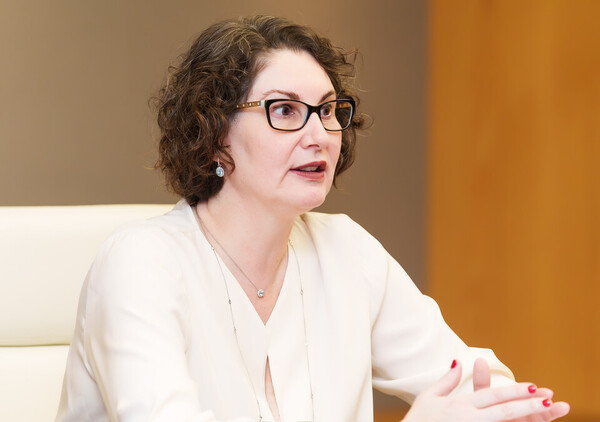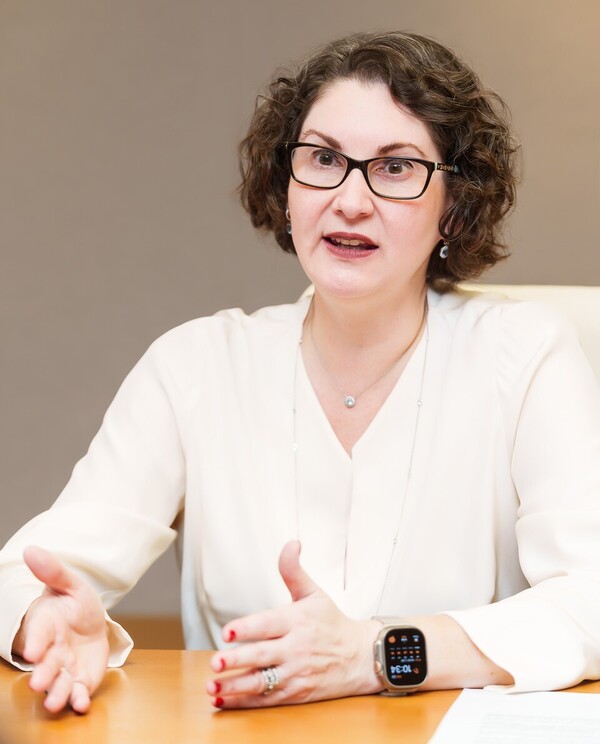"Korea is known for its successful clinical trials. However, underneath it is Korea’s characteristics of frequently delayed reimbursement for new drugs. I think part of it is to ensure access to new drugs by participating in clinical trials."
Ingrid A. Mayer, vice president of global clinical strategy for breast and gynecologic cancers at AstraZeneca, said so while assessing Korea's clinical trial capabilities during a recent interview with Korea Biomedical Review.

Mayer visited Korea late last month to meet with researchers contributing to AstraZeneca's major clinical studies.
AstraZeneca recently declared, “By 2030, one in three breast cancer patients worldwide will be able to overcome cancer with our treatments." One of the specific strategies to achieve this goal is to "conduct the right clinical program for every breast cancer patient.”
Mayer's visit aimed to meet with leading researchers and young researchers in Korea, who will be the field's future leaders, to foster connections and identify areas for further support.
AstraZeneca is researching and developing treatments for nearly every mechanism available in all breast cancer subtypes, with breast cancer-related therapies accounting for 30-40 percent of the company's oncology pipeline.
"We are researching and developing eight breast cancer therapies," Mayer said. "Looking at AstraZeneca's overall R&D, we have more than 180 ongoing clinical studies, 21 of which are breast cancer-specific clinical programs."
'Enhertu, Dato-DXd, and Camizestrant are top breast cancer drugs'
Vice President Mayer cited Enhertu (trastuzumab deruxtecan), Dato-DXd (datopotamab deruxtecan), and Camizestrant as the company's flagship breast cancer drugs.
"Enhertu is approved for HER2-positive breast cancer, which accounts for about 20 percent of breast cancer patients, and is also approved for hormone-positive HER2 low-expressing breast cancer, which is the larger subtype globally, and is currently available in about 60 percent of breast cancer patients," Mayer said. "We plan to expand the indication to include HER2 ultra-low breast cancer in future clinical studies. In this case, 85 percent of patients with hormone-positive breast cancer will be able to be treated with Enhertu."
In addition, datopotamab deruxtecan in aggressive triple-negative breast cancer is showing promising data in combination with the company's immuno-oncology drug Imfinzi (durvalumab), which Mayer believes could provide a meaningful treatment option in the future.
"In our phase 2 study, we saw response rates of more than 80 percent in patients with metastatic triple-negative breast cancer who received first-line treatment with the combination of datopotamab deruxtecan and Imfinzi," Mayer said. "While triple-negative breast cancer is not as common as other subtypes, it is an area of significant unmet need due to its aggressive nature. The results demonstrated by the combination of datopotamab deruxtecan and Imfinzi are very encouraging."
Vice President Mayer said she also believed that Camizestrant could become a new backbone agent to replace current endocrine therapy (ET) in the treatment of hormone-positive breast cancer.
"Camizestrant is a next-generation oral selective estrogen receptor degrader (SERD) that has been shown in clinical studies to inhibit estrogen signaling much more than current hormonal therapies," Mayer said. "It is an effective treatment in hormone-positive patients with ESR1 mutations and, if further developed successfully, could replace hormonal therapy in early and late-stage breast cancer."
‘Korea is a pivotal country for AstraZeneca's clinical research, but …’
Mayer emphasized that Korean researchers played a pivotal role in developing the three treatments. Korea is not just one of the participating countries; it also oversees clinical studies.
"The Enhertu and datopotamab deruxtecan trials are led by Professor Park Yeon-hee of the Department of Hematology/Oncology at Samsung Medical Center and Professor Lim Seock-ah of the Department of Hematology/Oncology at Seoul National University Hospital, who are serving as Principal Investigators (PIs),” Mayer noted. "These two investigators also serve as PIs for the CAMBRIA-1 and CAMBRIA-2 trials, respectively. These are large clinical programs with about 10,000 subjects, and these two investigators play pivotal roles and contribute very closely, including participation in the Executive Committee."
Mayer cites the unique nature of breast cancer in Korea as one of the reasons why the country plays a key role in AstraZeneca's breast cancer clinical research.
Breast cancer research, including the studies mentioned above, tends to focus on aggressive or high-volume hormone-positive breast cancers. In contrast, the current incidence of breast cancer in Korea is largely younger, and the majority of patients are hormone-positive.
"Our current research interests include DNA damage repair and PARP inhibitors," she said. "These drugs are effective in breast cancer patients with BRCA mutations. In other countries, BRCA-mutated cancers are relatively rare, and the number of patients is small. Still, Korea has a high prevalence of BRCA mutations among breast cancer patients, so the requirements for conducting clinical studies, such as patient recruitment, are well established."
Therefore, the clinical studies we are conducting are important for Korea, and both AstraZeneca and Korean researchers can learn from them, Mayer added.
Mayer also praised Korea's infrastructure for clinical trials. "There are several infrastructure requirements that are necessary for successful clinical research, including the ability to collect and ship tissue samples from patients, the ability to profile tissue samples for multiple mutations or other molecular characteristics, and the infrastructure for diagnostic testing,” she said. “Many institutions in Korea meet the requirements of being a good cancer clinical research center, and the contribution to clinical research in this respect is bound to be very high."
"Not only do Korean researchers have a good understanding of the science and mechanisms of different new therapies and how they might work in different patients, but they're also very good at managing adverse events and toxicities that patients might have and responding to new adverse events as they arise," she said. They're very good at taking in new information and responding to new drugs. That makes Korea a country with many advantages regarding clinical research."
Mayer explained that the Korean healthcare system's single-payer structure also affects its ability to conduct clinical research.
"Because Korea has a single-payer healthcare system and patients have the flexibility to choose their hospitals, hospitals with a large number of cancer patients have specialized cancer centers," she said. In one cancer center in Korea, about 30 percent of patients participate in clinical research."
However, the single-payer system often leads to delays in reimbursement for new drugs, and for the same reason, "clinical trials" are used to secure patient access to new drugs.
‘Recognizing Enhertu’s innovative drug price will be a stepping stone for the growth of Korea's biopharma industry"
Mayer said she felt especially frustrated by the lack of reimbursement for Enhertu and Lynparza (olaparib) in Korea. Although Enhertu is already used globally in patients with low HER2 expression, it is not reimbursed even in HER2-positive patients in Korea, resulting in a large gap between clinical research and clinical practice.
She also noted that it is "ironic" that Korean breast cancer patients have a high prevalence of BRCA mutations, which is why various clinical trials are underway here. Still, it is difficult for Korean patients to use the drugs with reimbursement while they have been approved due to clinical studies conducted in Korea.

"I had the opportunity to meet with Korean regulatory officials and researchers during my visit, and I understand their perspective," Mayer said. "The new drugs that have recently been launched worldwide are making a significant contribution to extending the lives of cancer patients, and while the demand for new drugs is increasing as more effective drugs are developed, it is also placing a greater financial burden on countries."
Mayer acknowledged that as patients survive longer with effective new drugs, they need to use them longer than before, and when the drugs become reimbursed, the longer patients live, the longer the government has to fund them.
Mayer said she understands this but wants regulators to understand it too, citing Enhertu as an example.
"Enhertu is an antibody-drug conjugate (ADC) that offers a revolutionary extension of survival over existing therapies and is in high demand globally," she said. "These innovative drugs take a lot of time, capital, and effort to manufacture and produce, so there is a lot of internal thought about appropriately allocating the limited supply of Enhertu across countries."
"Companies have no choice but to consider the costs of manufacturing and producing Enhertu and prioritize supply to countries that recognize Enhertu's breakthrough drug pricing," Mayer said. While we understand each country's financial situation, we also want to understand pharmaceutical companies' struggles."
"Just as pharmaceutical companies have invested heavily in developing innovative treatments that have demonstrated survival times that are more than four times longer than conventional treatments, it would be beneficial for them if countries with innovative drug pricing recognized their efforts to develop these innovative drugs," Mayer went on to say. "Korea is a fast-innovating country, and we believe that Korean pharmaceutical companies will soon be able to develop, manufacture and produce their ADCs. Therefore, if the price of ADCs is set at a price that reflects their innovation, Korean pharma companies will benefit from this, and it can be a stepping stone for the Korean biopharma industry to grow together."
"Through Enhertu, many women with breast cancer will be able to extend their lives. Please consider that Enhertu is an innovative treatment that can extend the lives of these women who are the center of their families and that the Korean government's decision to allocate limited production to the country is important to ensure that as many Korean patients as possible receive the drug, and that the setting of ADC prices is important for the development of the Korean biopharma industry."
Related articles
- All eyes of patients and drugmakers are on reimbursement of Enhertu
- Breast cancer patients keep appealing for quick reimbursement of Enhertu
- Enhertu moves closer to insurance coverage by passing drug-reimbursing panel
- Cancer expert appreciates Enhertu’s efficacy, advocates for flexible coverage
- Innovative new drug Enhertu to get insurance benefits as early as April
- Enhertu to get insurance coverage for metastatic breast/stomach cancer from April
- Breast cancer drug Enhertu's breakthrough results unveiled at GBCC 2024

